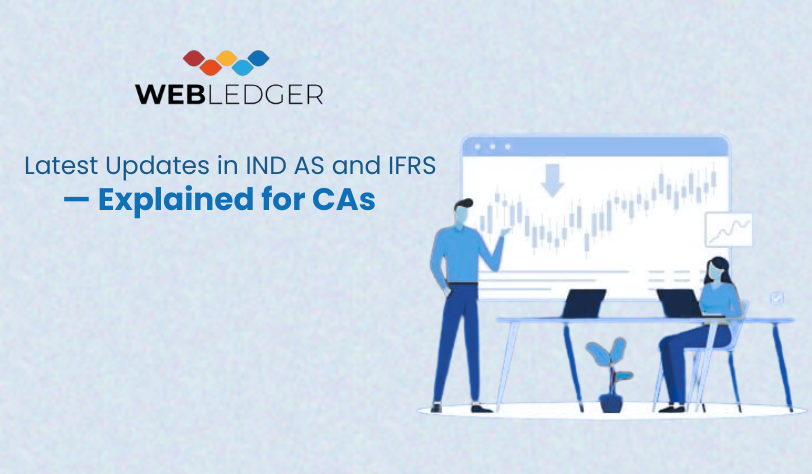
Latest Updates in IND AS and IFRS — Explained for CAs
Finance and compliance are not local anymore in the current business environment that is integrated on a global scale. Accounting standards are necessary whether you are a business with geographical reach or have set up to grow or expand your business with the help of modern cloud tools. In this article, we will take you through the three most credible frameworks, namely, IFRS, US GAAP and Ind AS, and then how cloud accounting software can make you automate and streamline finance. At the end of it, we will emphasize how WebLedger fits in this story, as one possible practical solution.
Importance of Accounting Standards
Consider accounting standards as a set of languages of reporting financial information. You have to have financial statements that are transparent, trustworthy and comparative when you are dealing with investors, lenders, partners or in more than one market. That is precisely what the purpose of such standards as IFRS, US GAAP and Ind AS is: to establish rules (or principles) such that when you declare your revenue, assets, liabilities, your audience will understand what you are talking about.
To businesses, particularly those that have aspirations that extend beyond their domestic setting this has significant advantages:
- Develops confidence with the outside stakeholders (investors, banks, regulators).
- Helps uphold transparency and government.
- Allows you to make comparisons with others and international benchmarking.
- Equips you to expand or make acquisitions or raise capital internationally.
Introduction to the Three Major Frameworks
Let us consider each of the three major frameworks, one at a time, what these are, the difference between them, and what it means to you.
What is IFRS?
The International Accounting Standards Board (IASB) is responsible for issuing the International Financial Reporting Standards (IFRS). They are made to be universal and geared towards principles.
Webledger
Please enter the OTP below to proceed.
- Operating in more than 140 countries in Europe and Asia and more.
- Focuses on fair value measurements (in most instances) and general comparability.
- Promotes transparency e.g. through disclosure of assumptions, estimates and risks.
- It is not as prescriptive and, therefore, gives businesses some leeway.
When your business operates across the border or when you want to invest internationally the language of choice will be the IFRS.
What is US GAAP?
In the United States, the Financial Accounting standard board (FASB) sets US Generally Accepted Accounting Principles (US GAAP).
- The US has mandatory requirements, marketable to all publicly traded companies and is very common in the US by other privately owned companies.
- More of a rule-based system than IFRS: various specific industry or transaction standards.
- In other instances, history places greater emphasis on historical cost measurement as compared to fair value.
- Is well-accepted (e.g. U.S. Securities and Exchange Commission requirements).
In case you are conducting business in or deal extensively in the US market (investors, regulators, subsidiaries), you might have to know US GAAP.
What is Ind AS?
IAS is an abbreviation that means Indian Accounting Standards. Introduced by the Ministry of Corporate Affairs in India, these have mostly converged with the IFRS but as per the Indian regulatory environment.
- Commenced being phased in since 2016 in the case of listed companies and large unlisted companies.
- Designed in such a way that Indian financial statements can be globally comparable and also address India-specific issues.
- Similar to many of the same fair value measurements and disclosures as IFRS.
- Assists Indian business to receive foreign investments and engage in the international markets.
Ind AS is a common starting point with Indian businesses–and where you plan to go international, unless you intend to bridge to IFRS or US GAAP you are likely to be caught between the two.
Some of the Differences Important
Although the three frameworks all strive to have reliable, transparent accounting, some of the major distinguishing factors as are:
- Revenue Recognition: both IFRS and Ind AS have a five-step revenue recognition model. The US GAAP has provided industry guidance in detail although convergence has occurred.
- Assets and Liabilities Measures: IFRS/IN AS permits more frequent fair value, whereas US GAAP even now in most instances uses historical cost.
- Financial Statements Presentation: IFRS/Ind AS permit more flexible formats; the US GAAP is inclined to predetermined formats and categories.
- Disclosure Requirements: IFRS/ Ind AS are principle based and have wider disclosures; US GAAP is rule based and provides much guidance on disclosures.
- Flexibility in Global operations: Ind AS is a gap between national regulation and global comparability; IFRS is globally focused; US GAAP US focused.
These variations might appear technical–but to your business these are turned into practical implications: your book preparation, your reporting to investors, your audit structuring, and your decision making using financial data.
Cloud Accounting Software is a Strategic Imperative
The rules are determined by accounting standards. But the manner in which you implement, report and act on financial data is greatly dependent on your tools. This is why cloud accounting software in the present context is significant:
- Real-Time Data & Dashboards: When using a cloud platform, it is possible to receive real time updates on all branches, geographies or business units. No longer lingering with the end of the month to see the big picture.
- Automation of Common processes: Automation of bank feeds, invoicing, reconciliation, taxation (GST, e-way bills, and so on) free up your financial department to more valuable work- analysis, strategy, forecasting.
- Multi-Entity / Multi-Standard Enablement: In the case you have a presence under multiple standards (i.e. in the home country under Ind AS and IFRS in consolidated reporting), then the software should have the ability to consolidate, translate, and also disclose.
- Audit Trail & Compliance: Cloud accounting provides you with audit trails, user access control, automated compliance checks, role-based user permissions which are particularly important with frameworks such as Ind AS/IFRS which require transparency.
- Scalability & Flexibility: The software needs to be able to expand with your business, new branches, new geographies, new product lines, without creating a massively large overhead and disrupting your business.
- Integration & Efficiency: You will be frequently required to be linked with billing, inventory, CRM, e-commerce, payroll. The current cloud platform offers APIs or in-built integrations in such a way that your financial data flows without any duplication, error, and delay.
- Concise: You must have the appropriate software to convert the technical savoir-faire of accounting standards into anything of beneficence (visibility, control, agility, compliance).
Final Thoughts
Mastery of accounting standards (IFRS, US GAAP, Ind AS) is not just an academic thing to do so that financial reporting can be credible and transparent, and it is the cornerstone of future growth. However, standards alone do not ensure efficiency or wisdom in your processes and finance systems count.
Strategic assets include cloud accounting software, which is compatible with automation, multi-entity consolidation, compliance, and real-time reporting. In the case of the Indian businesses that want to grow and operate in the contemporary economy, speaking of WebLedger is highly promising in terms of value–particularly, in the case you think of automation, visibility and scalability.
When your finance operation continues to wrestle with spread sheets, closes that are delayed, disjointed branch-data or manual compliance, it may be time to upgrade not only the software- but also your whole attitude. Select the appropriate technology, fit it to your standards-compliance requirements and consider finance an ally of expansion- not a back office.




